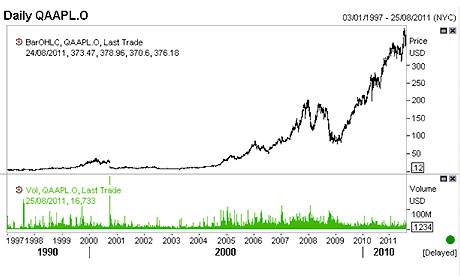
Steve Jobs's resignation as Apple chief executive has wiped billions of dollars off its stock market value as traders fret over the company's long-term future without its visionary leader.
The news of Jobs's departure sent Apple shares falling nearly 3% at the start of trading on Wall Street, knocking around $10bn (£6.1bn) off the company's value. The fall was slightly better than the 5% decline predicted before trading began, and meant Apple shares were changing hands for $365 each. They rose above $370 by late morning and were trading just 0.6% down in mid-afternoon.
Apple stock has enjoyed a stellar run under Jobs – just two weeks ago Apple briefly became the world's most valuable company,
The shares had hit a low of $3.19 in July 1997, a few months after Jobs rejoined the company he had co-founded in 1976. They climbed steadily to almost $200 by the end of 2007 thanks to the success of the iPod and the iPhone, and resurgent demand for Apple's desktop and laptop computers.
Apple stock fell back below $90 in early 2009, as shares slumped around the world, but quadrupled after that – thanks to a stream of record-breaking profits and impressive new launches, notably the iPad.
Shares in some of Apple's rivals rose in Asia overnight, as investors anticipated that Apple might stumble. Samsung Electronics, which is embroiled in a legal battle with Apple over its tablet computer, gained 2.4%, while smartphone maker HTC closed 1.35% higher.
Jobs's departure has been anticipated for some time, and his successor Tim Cook is highly respected. Many analysts believe Apple remains in safe hands, especially as Cook has been running Apple since the start of 2011, when Jobs took his third period of medical leave since being diagnosed with pancreatic cancer in 2004.
"While this marks the end of an era for Apple, it's important to remember the there's more to Apple than any one person, even Steve Jobs," said Michael Gartenberg, research director at Gartner. "Continuing as chairman, Mr Jobs will continue to leave his mark on both the company and products even as he transfers the reins to Mr Cook."
Ovum chief analyst Jan Dawson believes it would be illogical for Apple's value to fall immediately.
"The short-term selloff of Apple shares immediately after the announcement is driven by fears that Apple will not continue to perform as it has, once Steve Jobs leaves the CEO role. However, these fears appear relatively unfounded at least in the short term. Tim Cook, formerly COO [chief operating officer] and now CEO, has been in day-to-day charge of Apple not only since January, but during two previous periods when Steve Jobs's health prompted extended absences. On all three occasions, Steve Jobs was nevertheless involved in major decisions and continued to set strategy for the company. His new role as chairman suggests this will continue to be the case even if he does not sit at a desk in Cupertino for eight hours every day."
Dawson acknowledged, though, that Jobs's move has long-term ramifications for the company.
"Steve Jobs has provided both strategic vision and personal leadership at the top of the company, as arguably the most visible and well-known CEO of any technology company today. Tim Cook will not step easily into either of these roles, as a safe pair of hands but hardly a visionary or a charismatic figure."

